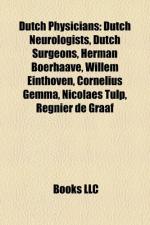|
This section contains 897 words (approx. 3 pages at 300 words per page) |

|
World of Anatomy and Physiology on Christiaan Eijkman
Christiaan Eijkman was a pioneer in the study of diseases that result from deficiencies in a patient's diet. His major contribution was the discovery that the lack of some vital substance in food caused a disease in chickens similar to beriberi in man. For this work, which helped lead to the concept of vitamins, he received the Nobel Prize in physiology or medicine in 1929.
Eijkman was born in Nijkerk, Netherlands. He was the seventh child of a schoolmaster father, also named Christiaan Eijkman, and Johanna Alida Pool Eijkman. Theirs was a family of academically gifted sons whose professional careers would encompass the fields of chemistry, linguistics, and radiology. Soon after Eijkman's birth, the family moved to Zaandam, where he received his early education. In 1875, he began training as a military medical officer at the University of Amsterdam. There, his own ability quickly made itself apparent; he received a...
|
This section contains 897 words (approx. 3 pages at 300 words per page) |

|


